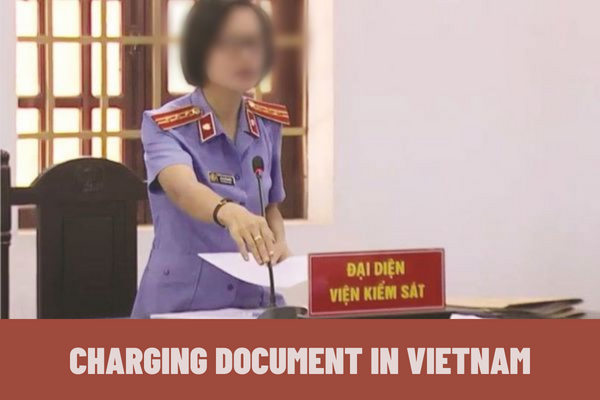What is a charging document in Vietnam? What is the time limit for transfer of case files and charging documents to the Court?
What is a charging document in Vietnam?
Currently, Vietnamese law does not have specific regulations on what a charging document is. However, a charging document can be understood as a legal document created by the Procuracy to confirm the prosecution of suspects before the court for trial.
Clause 1, Article 132 of the 2015 Criminal Procedure Code of Vietnam stipulates that the charging document is considered one of the types of procedural documents. At the same time, the charging document must be delivered to the accused and kept in the case file.

What is a charging document in Vietnam? What is the time limit for transfer of case files and charging documents to the Court? (Image from the Internet)
What are the contents of charging documents in Vietnam?
Pursuant to Article 243 of the 2015 Criminal Procedure Code of Vietnam on the decision to prosecute suspects as follows:
Decision to prosecute suspects
The procuracy shall decide to prosecute a suspect in a Court through charging documents.
Charging documents shall detail the progress and acts of crime; evidences clarifying suspects’ crimes, their artifices, motives, purposes, nature and degree of damage caused by the crimes; preventive and coercive measures enforced, altered or terminated; factors aggravating and mitigating criminal liabilities, traits and personal record of suspects; seizure and impoundment of documents and items, handling of evidences; reasons and circumstances leading to the crimes and other facts significant to the case.
The conclusion of the charging documents shall specify offence titles and articles, sections and points quoted from the Criminal Code.
Charging documents shall specify their date of issuance, full name and position of the person releasing such documents and bear his signature.
Thus:
- The procuracy shall decide to prosecute a suspect in a Court through charging documents.
- Charging documents shall detail:
+ The progress and acts of crime;
+ Evidences clarifying suspects’ crimes, their artifices, motives, purposes, nature and degree of damage caused by the crimes;
+ Preventive and coercive measures enforced, altered or terminated;
+ Factors aggravating and mitigating criminal liabilities, traits and personal record of suspects;
+ Seizure and impoundment of documents and items, handling of evidences;
+ Reasons and circumstances leading to the crimes and other facts significant to the case.
+ The conclusion of the charging documents shall specify offence titles and articles, sections and points quoted from the Criminal Code.
+ Charging documents shall specify their date of issuance, full name and position of the person releasing such documents and bear his signature.
What is the time limit for transfer of case files and charging documents to the Court?
According to Article 244 of the 2015 Criminal Procedure Code of Vietnam, the procuracy, in 03 days upon issuing charging documents, must submit case files and charging documents to the Court.
The time limit for filing papers and charging documents of a complex case in the Court may be extended for 10 more days at most.
If suspects are in detention, the Procuracy shall, in 07 days prior to the end of the detention, inform the Court to consider and decide the detention of such suspects before obtaining case files.
When should a new charging document be issued?
According to Article 246 of the 2015 Criminal Procedure Code of Vietnam, if the Court decides to return case files and request further investigation, the Procuracy shall consider justifications for further investigation and handle such request in the following manner:
- The Court reach a justified decision to return documents to investigation authorities, which The procuracy deems unnecessary, for further investigation; therefore, the Procuracy is entitled to directly carry out certain activities of investigation to supplement documents and evidences. However, the Procuracy, if unable to conduct further investigation, shall forward documents to investigation authorities for additional investigative activities.
If additional findings alter the fundamentals of existing charging documents, the Procuracy shall redress such documents and convey documents to the Court. If additional findings lead to the dismissal of the case, the Procuracy shall decide to have the case dismissed and send a notice to the Court;
- The procuracy, if finding no justifications for the return of documents for further investigation, shall state its reasons, maintain the decision to prosecute and send documents back to the Court.
LawNet